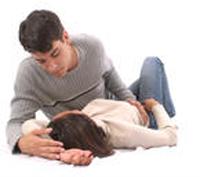
About sexual dysfunction Sexual dysfunction or sexual malfunction is difficulty during any stage of the sexual act (which includes desire, arousal, orgasm, and resolution) that prevents the individual or couple from enjoying sexual activity. Sexual difficulties can begin early in a person's sex life or they may develop after an individual has previously experienced enjoyable and satisfying sex. A problem may develop gradually over time, or may occur suddenly as a total or partial inability to participate in one or more stages of the sexual act. The causes of sexual difficulties can be physical, psychological, or both. Emotional factors affecting sex include both interpersonal problems (such as marital/relationship problems, or lack of trust and open communication between partners) and psychological problems within the individual (depression, sexual fears or guilt, past sexual trauma, and so on). Sexual dysfunctions are more common in the early adult years, with the majority of people seeking care for such conditions during their late twenties through thirties. The incidence increases again in the geriatric population, typically with gradual onset of symptoms that are associated most commonly with medical causes of sexual dysfunction. Sexual dysfunction is more common in people who abuse alcohol and drugs. It is also more likely in people suffering from diabetes and degenerative neurological disorders. Ongoing psychological problems, difficulty maintaining relationships or chronic disharmony with the current sexual partner can also interfere with sexual function.
The problem of maintaining an erection The problem of an inadequate erection is probably one of the biggest issues a man confronts. Most men experience erectile problems on occasion, but impotence, also called erectile dysfunction, is defined as "the persistent failure to develop and maintain erections of sufficient rigidity for penetrative sexual intercourse." Of course, men have other kinds of sexual problems including lack of desire and problems with ejaculation, yet impotence is the most common and troubling. A recent study estimates that 30 million men suffer from various degrees of erectile dysfunction. This can range from mild to severe. It is clearly an age-related phenomenon with the prevalence of erectile dysfunction increasing significantly with age. Surprisingly, by the time men reach 40, 5% of them are completely impotent never achieving an erection rigid enough for penetration. Approximately 15% have significant problems achieving or maintaining an erection. Erections can change over time, sometimes stronger or weaker than other times. When men are in their teens they often have little control over their erections and obtain erections when not in a sexual situation. For most men this stops in their late teens to early twenties. As men get older, erections may not always be obtained when they want one. Almost every man has the occasional time when their erection is less strong than they would like but sometimes it becomes a problem. In order to increase the size of an erection, there must be an increase in blood flow and, at the same time, the blood has to be prevented from leaving the penis. Nerves must be working normally for a man to get and keep an erection. Nerve damage can result from diabetes, multiple sclerosis, prostate surgery or damage to the spinal cord. Psychological issues such as depression, anxiety, guilt or fear can sometimes cause sexual problems. At one time, these factors were thought to be the major cause of erectile dysfunction. Doctors now know that physical factors are present in most men with erectile dysfunction. However, embarrassment or "performance anxiety" can make a physical problem worse. Erectile dysfunction caused only by psychological causes is found most commonly in young men. Little is known about how to prevent erectile dysfunction. However, avoiding cigarette smoking and maintaining normal blood pressure and cholesterol levels can help because smoking and high cholesterol can affect blood vessels. Men with diabetes should strive to keep blood sugar levels under control. Because certain medications have been associated with erectile dysfunction, ask your doctor about possible side effects before you start using any new prescription. There are many effective treatments for erectile dysfunction. The most popular option is a class of drugs called phosphodiesterase type 5 (PDE5) inhibitors, which includes sildenafil (Viagra), vardenafil (Levitra) and tadalafil (Cialis). These drugs, taken in pill form from zero to 60 minutes before sexual activity, work in approximately 70 percent of men, though they are less effective in men with neurological causes of erectile dysfunction such as nerve damage from prostate surgery, diabetes or spinal cord injury. If Sildenafil (Viagra), vardenafil (Levitra) and tadalafil (Cialis) drugs don't work or cannot be used because of potential side effects, your doctor can recommend other therapies. The drug alprostadil (Caverject, Edex, Muse) causes blood vessels to widen. This can allow blood to flow more freely in the penis, leading to an erection. The drug can be injected with a tiny needle, or a small pellet (suppository) can be inserted into the opening of the penis. Suppositories like this are effective in approximately two-thirds of men. Injections are effective about 80 percent of the time. Men who do not benefit from medical or psychological treatment often have success with mechanical or prosthetic devices. External products, known as vacuum erection devices, are safe and highly effective, but many men and their partners find them unappealing. Another option is a surgically placed penile implant. However, because implants require surgery (with the risk of surgical complications), only 10 percent of men with erectile dysfunction choose this option. Vascular (blood vessel) surgery sometimes is recommended for young, healthy men who develop impotence after trauma to the groin.

Definitions on this pageAnxiety
- A state of uneasiness and apprehension, as about future uncertainties.
- Worry or tension in response to real or imagined stress, danger, or dreaded situations. Physical reactions such as fast pulse, sweating, trembling, fatigue, and weakness may accompany anxiety.
Impotence
- The inability to achieve and sustain penile erections.
Thyroid
- A gland in the throat that produces hormones that regulate growth and metabolism.
- A large gland in the neck that functions in the endocrine system. The thyroid secretes hormones that regulate growth and metabolism.
Antihistamines
- A drug used to counteract the physiological effects of histamine production in allergic reactions and colds.
Antihypertensives
- Reducing or controlling high blood pressure.
Depression
- In psychiatry, a symptom of mood disorder characterized by intense feelings of loss, sadness, hopelessness, failure, and rejection.
Ejaculation
- The expulsion of seminal fluid from the urethra of the penis during orgasm.
- The process of ejecting semen from the penis, and is usually accompanied by orgasm as a result of sexual stimulation.
Erection
- The firm and enlarged condition of a body organ or part when the erectile tissue surrounding it becomes filled with blood, especially such a condition of the penis or clitoris.
Estrogen
- Any of several steroid hormones produced chiefly by the ovaries and responsible for promoting estrus and the development and maintenance of female secondary sex characteristics.
- Any one of a group of hormones synthesized by the reproductive organs and adrenal glands in females and, in lesser quantities, in males.
Frigidity
- The state of marked or abnormal sexual indifference.
- Sexual unresponsiveness (especially of women) and inability to achieve orgasm during intercourse.
Hormone
- A substance, usually a peptide or steroid, produced by one tissue and conveyed by the bloodstream to another to effect physiological activity, such as growth or metabolism.
Orgasm
- The peak of sexual excitement, characterized by strong feelings of pleasure and by a series of involuntary contractions of the muscles of the genitals, usually accompanied by the ejaculation of semen by the male.
- The highest point of sexual excitement, marked by strong feelings of pleasure and marked normally by ejaculation of semen by the male and by vaginal contractions within the female.
Paraplegics
- Complete paralysis of the lower half of the body including both legs, usually caused by damage to the spinal cord.
Penis
- The male organ of copulation in higher vertebrates, homologous with the clitoris. In mammals, it also serves as the male organ of urinary excretion.
- The organ of the male reproductive system through which semen passes out of the body during sexual intercourse. The penis is also an organ of urination.
Prostate
- Gland in males that surrounds the urine tube (urethra) at the base of the bladder.
- A firm partly muscular chestnut sized gland in males at the neck of the urethra; produces a viscid secretion that is the fluid part of semen.
Stress
- A state of extreme difficulty, pressure, or strain.
- A physical and psychological response that results from being exposed to a demand or pressure.
Testosterone
- A white crystalline steroid hormone, C19H28O2, produced primarily in the testes and responsible for the development and maintenance of male secondary sex characteristics. It is also produced synthetically for use in medical treatment.
|